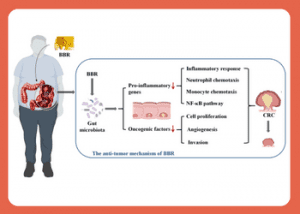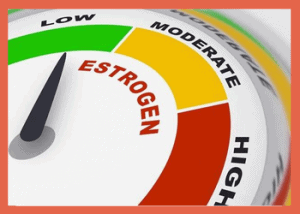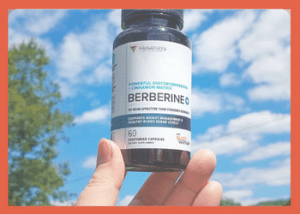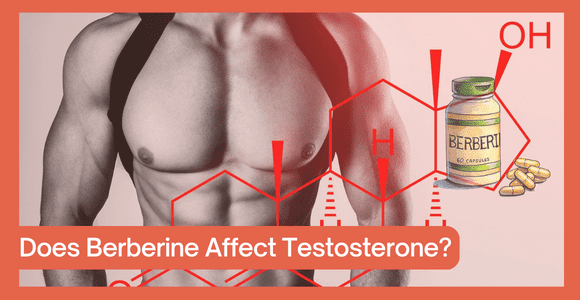For centuries, traditional Chinese medicine has utilized the alkaloid Berberine found in plants like barberry, goldenseal, and Oregon grape.
Now berberine is available as a supplement in tablets or capsule form, powder or liquid; scientific research is uncovering numerous health benefits for men prompted by berberine consumption.
These include improved blood sugar regulation, weight loss support, and enhanced cardiovascular well-being to name but a few! Make sure you’re giving your body what it needs – add some berberine to your diet today.
Table of Contents
What is Berberine? Benefits & Side Effects

Berberine belongs to the alkaloid family, a set of naturally-occurring substances containing nitrogen atoms. Berberine has been used in traditional Chinese medicine and Ayurveda for centuries, employed as an aid to treat many health issues such as diarrhea, infections, and high blood sugar levels.
Recent scientific discoveries have uncovered the tremendous potential of berberine, a natural compound found in many plants.
Berberine was found to ameliorate erectile dysfunction in rats with diabetes mellitus by improving endothelial function, and inhibiting apoptosis and fibrosis. This is likely due to its ability to suppress the sphingosine kinase 1/sphingosine-1-phosphate/S1PR2 and mitogen-activated protein kinase pathways.
From anti-inflammatory and antioxidant properties to improved glucose metabolism, and potential benefits for hair growth, berberine may hold the key to treating metabolic disorders like metformin such as type 2 diabetes.
Berberine boasts a plethora of possible advantages and adverse reactions, including:
| Benefits | Side Effects |
|---|---|
| Improved blood sugar control | Nausea, stomach cramps, and diarrhea |
| Weight loss | Headache |
| Cardiovascular health | Low blood sugar |
| Anti-inflammatory effects | Constipation |
| Anti-cancer effects | Interaction with certain medications |
Not only that but it has been noted for its incredible ability to fight cancerous cells! With all these benefits taken into account, there is no denying that further research into this powerful substance should be conducted soon.
 Berberine has been discovered to possess anti-cancer properties, with laboratory studies demonstrating its ability to inhibit the growth of cancer cells.
Berberine has been discovered to possess anti-cancer properties, with laboratory studies demonstrating its ability to inhibit the growth of cancer cells.
Additionally, Berberine’s effects on the gut microbiome have also been established – it modifies and optimizes the composition of bacteria in your body by suppressing harmful microorganisms while promoting beneficial ones.
Using berberine may be beneficial for general digestive well-being and could have far-reaching impacts on a variety of health issues.
However, it is vital to understand that more research must be done in order to grasp the full effects of this substance on humans; thus, it should only be used with professional medical advice.
Benefits of Berberine for Men
Recent research has presented compelling evidence that berberine can offer numerous advantages to men, such as:
- Improved blood sugar control: Studies have demonstrated that Berberine can significantly boost glucose metabolism and lower blood sugar levels, consequently making it a potentially effective treatment for metabolic disorders, such as type 2 diabetes.
- Weight loss: Recent research has revealed that Berberine can be a powerful aid for weight loss, aiding individuals by diminishing hunger and catalyzing the disintegration of fats.
- Cardiovascular health: With its powerful cholesterol-lowering and triglyceride-reducing properties, Berberine may be a viable solution for improving cardiovascular health.
- Boosting testosterone levels: Berberine has been scientifically proven to increase testosterone levels in men, an essential hormone for overall well-being. Low T can result in a myriad of health issues such as reduced muscle mass, lack of libido, and even osteoporosis. Supplementing with Berberine may help to prevent these ailments from occurring! Berberine is not a supplement typically utilized for bodybuilding objectives.
- Anti-inflammatory effects: Berberine has been discovered to have anti-inflammatory capabilities, potentially lowering the risk of developing chronic conditions including cancer, heart disease, and even Alzheimer’s.
Can Berberine Increase Testosterone In Men?
To address the lack of consensus regarding berberine, a randomized controlled trial published in Nutrients was recently conducted. This research sought to understand and resolve the apparent discrepancies that have been noted with this topic.
After conducting studies on Chinese individuals, the authors found that berberine decreases cholesterol levels in men, and interestingly enough could potentially boost their testosterone production.
 Other authors have also come to a similar conclusion after exploring the scientific evidence in detail through their review and meta-analysis.
Other authors have also come to a similar conclusion after exploring the scientific evidence in detail through their review and meta-analysis.
Although this article is currently pending peer review, if future research continues pointing in the same direction, berberine could be beneficial as part of a hormone-balancing program for individuals whose testosterone levels are lower than what is typical for their sex.
Thus, they suggest that berberine has sex-specific effects. To put it differently, testosterone levels may be reduced in females with polycystic ovary syndrome, yet elevated in males. This sex-based difference is a comparatively new branch of exploration.
In summary, certain studies demonstrate that berberine has a testosterone-lowering effect while other research points towards increased levels. After analyzing patients’ age and gender, it seems berberine affects hormone levels differently depending on sex.
Does Berberine Increase Estrogen?
Despite a few studies suggesting berberine may act as an estrogen-like substance, further research is essential to confirm its effects on hormone levels.
As individual sensitivities are prone to fluctuate, it is emphatically important that anyone considering the use of berberine does so with the help and guidance of their healthcare provider.
 This experimental study was conducted by randomly dividing the rats into eight groups: a normal control group, berberine (25, 50, and 100mg/kg intragastrically daily) administered alone, PCOS Control Rats given letrozole (1 mg/kg intragastrically daily), and rats treated with both berberine (25, 50 and 100 mg/ kg intragastrically daily) plus letrozole.
This experimental study was conducted by randomly dividing the rats into eight groups: a normal control group, berberine (25, 50, and 100mg/kg intragastrically daily) administered alone, PCOS Control Rats given letrozole (1 mg/kg intragastrically daily), and rats treated with both berberine (25, 50 and 100 mg/ kg intragastrically daily) plus letrozole.
Berberine administration began thirty minutes prior to the first dose of letrozole until 28 days later.24 hours post-treatment, the animals were administered anesthesia and a blood sample was then extracted from their heart.
The isolated serum underwent testing to measure levels of estrogen, progesterone, LH, FSH, and testosterone. Subsequently, the data was put through one-way ANOVA for analysis.
Results: The results of our study revealed that treating with letrozole alone decreased FSH and progesterone levels while increasing LH, estrogen, and testosterone.
Subsequently, the administration of berberine caused a significant rise in FSH and progesterone as well as a notable decline in LH, estrogen, and testosterone concentrations. Ultimately it was determined that administrating berberine to Letrozole-induced PCOS rats stabilized sex hormones effectively.
Berberine’s Differing Effect on Men and Women
According to this trial, berberine supplementation had the opposite effect in men than it did in women. While studies have shown that berberine lowers testosterone levels among women, results from this study show that it actually increases testosterone levels among male participants.
Furthermore, these observations serve as evidence for the sex-specific effects of berberine and may provide a reference point for further research on the matter. As noted by researchers: “Our study examined the effect of berberine on testosterone and thromboxane A2 in men for the first time…”
Recent research has indicated that there may be gender-based differences in how berberine impacts the body.
- A study featured in the Journal of Ethnopharmacology reported that berberine supplementation was effective at controlling blood sugar levels in men with type 2 diabetes, yet had no effect on women.
- A separate research, published in the Journal of Functional Foods, discovered that berberine helped enhance insulin sensitivity among men but not women.
- However, further research is required to validate these conclusions and comprehend the reasons why there may be differences in effects.
- Female individuals should always consult their healthcare provider prior to taking berberine supplements, particularly if they are in the stages of pregnancy or lactation.
Research has demonstrated that berberine could be an effective approach in improving metabolic health for both men and women alike, such as decreasing cholesterol and glucose levels. Current studies suggest berberine may have varying effects between males and females.
Factors to Consider Before Purchasing Berberine Supplements
Before committing to a product or brand, it’s important that you conduct thorough research and find one that suits your preferences.
Taking an uninformed plunge in the investment process could result in unpleasant consequences – you’d be paying for something not worth its value.
 Therefore, it is essential to be informed about whatever you plan on consuming as these decisions can have a great impact in regards to your health.
Therefore, it is essential to be informed about whatever you plan on consuming as these decisions can have a great impact in regards to your health.
If proper caution isn’t taken when selecting products and brands, the outcomes could prove unfavorable for your well-being – something that should never be at risk!
With so many Berberine supplement vendors and brands out there, it can be hard to decide which one is most reliable.
Before you shop either in stores or online, do your due diligence! With careful research, you will discover the finest product that caters to all of your requirements!
When making a decision, it is important to consider the following factors:
- Unlock the true potential of your dietary supplement by taking it at the suggested dosage for maximum potency and purity.
- If you’re looking for a supplemental boost, consider choosing from the variety of forms available—capsules, tablets, and powder are among your options.
- To thrive and succeed in the long term, it is essential to foster an impeccable reputation and continuously uphold the highest standards of excellence.
- Investigating additional variables and how they interact with drugs
- Before you decide to buy anything, make sure that you speak with a medical professional.
In contrast to certain organizations that may opt for dishonest advertising or misinforming ads to promote their inferior products, an abundance of reputable brands still remains.
Frequently Asked Questions
Does Elderberry increase Testosterone?
While scientific research has yet to prove that elderberry directly boosts testosterone levels, its antioxidant and anti-inflammatory effects have been supportive in treating colds and flu.
Furthermore, initial studies hint at the possibility of it potentially enhancing cardiovascular health while stabilizing blood sugar levels; however, more thorough exploration is necessary to establish these outcomes.
Does Bromelain Boost Testosterone?
 Bromelain, an enzyme-rich mixture derived from pineapple stems, is widely used as a dietary supplement and in some traditional medicines.
Bromelain, an enzyme-rich mixture derived from pineapple stems, is widely used as a dietary supplement and in some traditional medicines.
Studies demonstrate that Bromelain has anti-inflammatory and immunity-boosting qualities as well as potential digestive benefits.
However, there is no scientific research to indicate that it directly influences testosterone levels given that it does not act like a hormone.
Bromelain may possibly aid in anabolic effects by ameliorating inflammation and muscular soreness. Still, it is essential to confer with a healthcare provider prior to beginning any supplement regimen.
Can Berberine Affect Menstrual Cycle?
Our findings revealed that berberine alone produced moderate results in terms of menstrual pattern and ovulation rate. Interestingly, both the normal weight group and overweight/obese groups showed no remarkable difference in relation to these two variables.
Does Berberine Lower Testosterone?
Berberine’s capability to act as a selective androgen receptor modulator implies that it may interact with testosterone. To put it another way, Berberine affects how the body’s androgen receptors respond to testosterone – similarly to how insulin sensitivity works in the body.
 Extensive studies have uncovered the efficacy of berberine in targeting and stimulating protein degradation within the androgen receptor.
Extensive studies have uncovered the efficacy of berberine in targeting and stimulating protein degradation within the androgen receptor.
Subsequently, testosterone has reduced effectiveness when it comes to reaching out to certain cells due to this occurrence.
Interestingly, evidence regarding berberine and testosterone levels is quite conflicting.
For instance, female patients with polycystic ovary syndrome may experience a decrease in insulin resistance and testosterone levels after taking berberine; however, other studies on the same type of patient have yielded contrasting outcomes.
The biochemical process of protein degradation outlined above is already understood; however, the ramifications that berberine has on testosterone levels remain to be determined.
Can You Take Berberine On an Empty Stomach?
Taking Berberine on an empty stomach may enhance its potency for certain advantages like improved blood sugar balance and weight loss. It’s worth noting, though, that research has shown berberine is effectively absorbed regardless of when you take it.
Should You Take Berberine?
Berberine has shown itself to be generally secure at standard doses, but more research into its safety over a longer period of time is still necessary. Several people have reported feeling some stomach-related unfavorable effects when taking berberine as a supplement, including upset stomach, diarrhea, constipation, and gas.
How Long Does it Take for Berberine to Lower Cholesterol?
The timeframe for Berberine to lower cholesterol levels can vary among individuals and depends on several factors, including dosage, duration of use, baseline cholesterol levels, and overall health. Berberine, a compound extracted from various plants, has garnered attention for its potential lipid-lowering effects. However, the process of cholesterol reduction is not immediate and requires consistent use over a certain period.
Clinical studies have demonstrated that Berberine can lead to noticeable reductions in total cholesterol, LDL cholesterol (often referred to as “bad” cholesterol), and triglycerides, while also increasing HDL cholesterol (“good” cholesterol). These effects are attributed to Berberine’s ability to regulate lipid metabolism and influence various cellular pathways involved in cholesterol synthesis and transport.
On average, individuals using Berberine supplements typically see improvements in cholesterol levels within a few weeks to a few months. Some studies have reported significant reductions in cholesterol levels after just four weeks of supplementation, while others have shown more substantial changes after two to three months.
For instance, a study published in the Journal of Clinical Endocrinology & Metabolism in 2008 investigated the effects of Berberine on cholesterol levels. The study participants, who had high cholesterol levels, were administered Berberine for three months. By the end of the study period, significant decreases in total cholesterol, LDL cholesterol, and triglycerides were observed, along with an increase in HDL cholesterol.
It’s important to note that individual responses can vary widely. Factors such as diet, exercise, genetics, and the presence of underlying health conditions can influence how quickly Berberine affects cholesterol levels. Additionally, the dosage of Berberine used can impact the rate of cholesterol reduction. Most studies have used dosages ranging from 500 to 1500 milligrams per day.
As with any supplement or treatment, it’s advisable to work closely with a healthcare provider when using Berberine for cholesterol management. Regular monitoring of cholesterol levels is essential to track progress and adjust treatment plans as needed. Berberine may also interact with certain medications, so consulting a healthcare professional before starting supplementation is crucial, especially if you’re taking other cholesterol-lowering medications or have existing medical conditions.
In conclusion, it has the potential to lower cholesterol levels, but the timeframe for these effects to become noticeable varies from a few weeks to a few months. Consistent use, appropriate dosage, and individual factors play a significant role in determining the speed and extent of cholesterol reduction. To ensure safety and effectiveness, consult with a healthcare provider before incorporating Berberine into your regimen and undergo regular cholesterol level assessments during its use.
Conclusion
Testosterone is a vital hormone for male sexual maturation and plays an essential role in the metabolism of carbohydrates, fats, and red blood cells.
Berberine is an alkaloid supplement used to manage glucose levels as well as address metabolic health issues like type 2 diabetes and metabolic syndrome. Interestingly enough, it also has potential effects on testosterone synthesis and its receptors within the body!
Berberine’s impacts on testosterone levels are still contested, but current research indicates that the effects may vary depending on gender. As such, it has emerged as a possible way to support hormone health; in males, there is potential for an increase in testosterone while women may experience a decrease.
Aside from its function regarding hormones, it can be used to reduce cholesterol and lessen risks related to heart disease and metabolic disorders—making it ideal for any detoxification routine.
